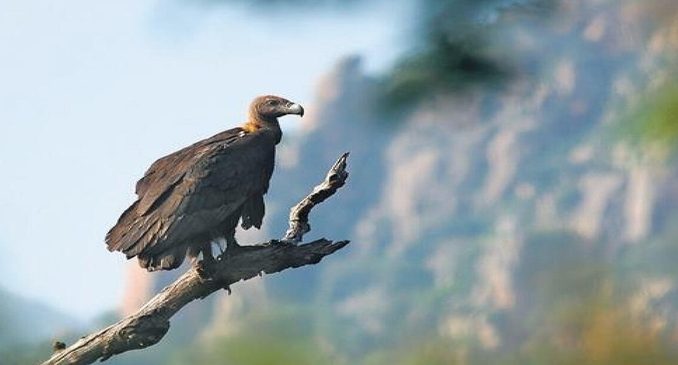
In News
For the conservation of vultures in the country, a Vulture Action Plan is launched.
In-Detail
- For the conservation of vultures in the country, the Union Minister for Environment, Forests and Climate Change launched a Vulture Action Plan 2020-25.
- Since 1990, India saw a steep decline in the vulture numbers and is one of the drastic declines of bird populations in the world.
- Since 2006, the Ministry has been carrying a conservation project for vultures and now the project is extended to 2025.
- The main focus of the project is to halt the decline and also acts to increase the vulture population.
- In the country, there are nine recorded species of vulture.
- The species are the Oriental white-backed, slender-billed, Himalayan, long-billed, red-headed, Egyptian, bearded, Eurasian Griffon and cinereous.
- The critically endangered species are the Oriental white-backed, long-billed, slender-billed and red-headed vultures.
- Between 1990 and 2007, the critically endangered species crashed massively with 99% of them wiped off.
- Now, there is a decline in the red-headed vultures with a decline of 91% and Egyptian vultures by 80%.
- The Egyptian Vultures are listed as the endangered species.
- While the Himalayan, bearded and cinereous vultures are listed as ‘near threatened’.
- The cause for the crash in the vulture’s population came into limelight in 2004.
- The cause of the crash is due to a drug called diclofenac.
- Diclofenac is a veterinary nonsteroidal anti-inflammatory drug (NSAID) used to treat inflammatory diseases like gout and pain.
- The vultures would feed on this type of carcass.
- To eliminate 99% of the vulture populations, 0.4-0.7% of animal carcasses contaminated with diclofenac is sufficient.
- In 2006, the MoEFCC launched the Action Plan for vulture conservation.
- In the same year, DCGI banned the use of diclofenac.
- The Vulture Conservation Breeding Programme was established by the Central Zoo Authority (CZA) and Bombay Natural History Society (BNHS).
- Now this centre has three critically endangered species that are bred in the captivity.
- At present, there are 8 centres and 396 vultures of the three species are present.
- Now the ministry has launched the conservation programme for the redheaded and the Egyptian vultures.
- At 8 different places in the country, the Vulture Safe Zone Programme is implemented and two in Uttar Pradesh.
- By ensuring the minimum use of diclofenac, attempts are made to secure the vultures.
- When no toxic drugs are found in the pharmacy and cattle carcass surveys for two consecutive years and when there is no decline in the vulture population, then the area will be declared as a Vulture Safe Zone.
- The action plan aims to ensure that the sale of veterinary NSAIDs are regulated and livestock treated by qualified veterinarians.
- The Ministry is planning to develop safe NSAIDs on vultures.
- Additional Conservation Breeding centres are also being planned, one each at Uttar Pradesh, Tripura, Maharashtra, Karnataka and West Bengal.
- In the Vulture Conservation centres, samples and information can be collected from the wild, can be analysed and stored.
- Four Rescue Centres have been proposed in Pinjore in the north, Guwahati in the Northeast, Bhopal in Central India and Hyderabad in South India.
Tags: Best IAS Coaching in Delhi | IAS Mock Interview | Best Online Civil Service Coaching India | Best Online UPSC Coaching | Top Online IAS Coaching In Delhi | Best Online IAS Institute In Delhi

Leave a Reply
You must be logged in to post a comment.